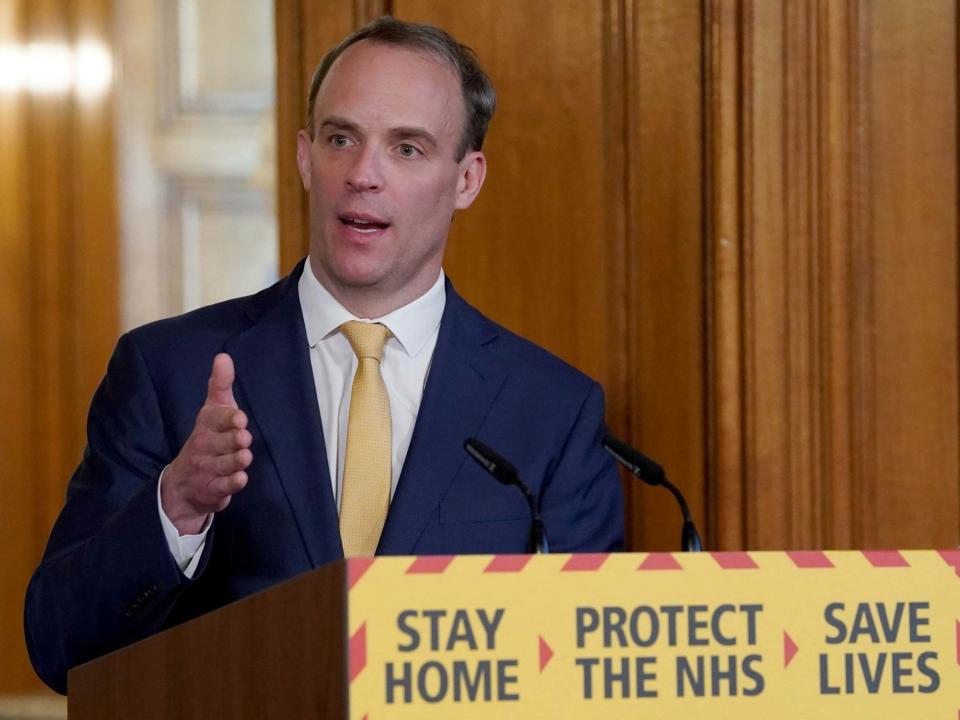With Boris Johnson in hospital, ministers are jockeying for position – now is not the time to play politics

Can the government cope without Boris Johnson while he remains seriously ill? It will not be easy. The machine will miss his drive and energy at such a critical moment. The public will miss his bouncy optimism.
Dominic Raab, the foreign secretary, is not acting prime minister. As first secretary of state, he is deputising for Johnson “where necessary.” But confusion over his role, and claims of a power vacuum, strengthen the case for having a formal deputy prime minister.
Lord Lexden, the Conservative Party’s historian, argues that “no incumbent of Number 10 would favour” a clear plan for replacing them in an emergency. That’s politics. Yet the chain of command would be clearer under a deputy PM, who would enjoy greater authority.
Raab points to collective cabinet responsibility, recognising he must take his fellow ministers with him. But this rule is about ministers toeing the cabinet line in public if they lose the argument in private. The PM, or their stand-in, plays a crucial role in summing up cabinet debates; their own view can be critical if ministers are divided.
Raab, who is little known to the public, is a surprise choice. His campaign to win the Tory leadership last year did not take off. But Johnson’s allies say the fellow Vote Leave campaigner won the PM’s trust after backing Johnson when he was eliminated. That is another way of saying that when he formed his government last July, Johnson did not entirely trust the obvious candidate to be his unofficial deputy: Michael Gove, who abandoned him in the 2016 leadership election to run himself.
The Department for Health has an understandable counterview: it wants a relentless focus on the immediate public health emergency, and fears talk of easing the restrictions will encourage the public to ignore them, prolonging the crisis.
Ministers insist they will “rely on medical and scientific advice” but difficult political judgements will soon have to be made. Should schools reopen after the Easter break? Should some shops reopen if they maintain social distancing rules? Should some parts of the UK see the curbs lifted before others?
Ministers insist they will protect both “livelihoods and lives”, but they will soon have to prioritise. It’s an invidious decision; no politician can risk accusations of writing off old people to protect the economy for younger generations.
Tensions between cabinet ministers over the exit strategy have started to surface in public. There has been sniping between allies of Gove, who is in charge of “public services implementation” and Matt Hancock, the health secretary, whose target of 100,000 tests a day by the end of this month is viewed with scepticism by some ministers. Raab might struggle to contain such tensions. But if he oversteps the mark, ministers might bite back, which would be bound to leak out, calling the government’s competence into question.
Ministers should stop jostling for position and end their blame game in which mistakes are laid at the door of Public Health England, NHS England or civil servants, who suspect politicians are covering their backs ahead of the inevitable inquiry into the government’s preparations for and response to the crisis.
The public will not look kindly on the game-playing and jockeying for position we have seen so far. The already daunting challenge for ministers has got even bigger with Johnson out of the picture. For the country’s sake, the cabinet needs to raise its game.
Read more
When can we really expect coronavirus to end?
Everything you need to know on supermarket delivery slots
The dirty truth about washing your hands
Which countries around the world has coronavirus spread to?
Listen to the latest episode of The Independent Coronavirus Podcast

 Yahoo News
Yahoo News 